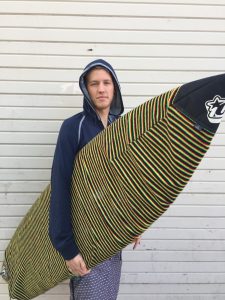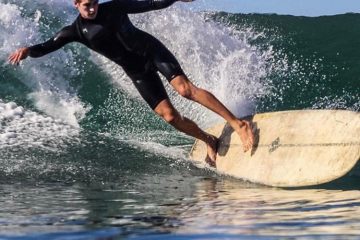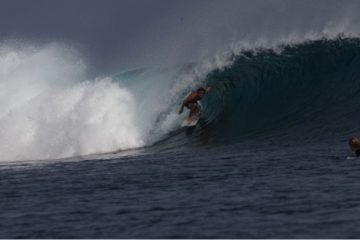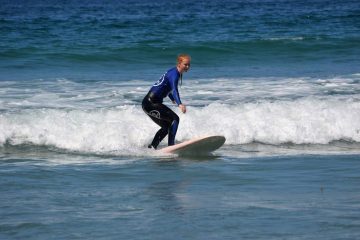A Lost Art Form
While walking from El Porto to Marine Street, I saw a surfer dressed in sweats and with a hood on. There were not many other surfers out, probably because it had just rained. I approached the surfer and he introduced himself to me as Jason, a 21 year old from southern San Diego. Initially when I asked him about the waves that day he responded that he thought the waves would be good because the tide was dropping, but there ended up not being enough swell.
Jason described the people in El Porto as “kooky” and then further explained that there’s actually a lot of surfers that “rip” but a lot of the people are grumpy old men that want to yell at somebody when they surf—and aren’t even that good at surfing.
“It’s way better than P.V.,” he says, referring to Palos Verdes, a beach known for localism, “but it’s not still not very friendly here.”

Jason says surfing has become commercialized
and brand-focused | Photo by Kelsey Kafka
Jason says it’s more fun surfing his hometown of Point Loma or Mexico, where the people are nicer and the water is cleaner ”and everyone surfed better!”
Besides not liking El Porto very much he still goes to surf there frequently, as well as Zuma in Malibu, just because “it’s really hollow when it gets good and you can make it out.”
Jason seemed very interested and opinionated about the surf culture and how surfing has become very commercialized and all about branding and sponsorships. Jason was very in tune with how surf culture has changed and even started talking about the changes without me asking him.
“The whole industry has been commercialized and stigmatized by certain companies,” he says. “It used to be more rebellious and used to be more about the surfing, but now it’s more about the market of surfing. It seems like you can’t go five feet without some motherfucker asking you who you’re sponsored by or who you ride for or all this bullshit.”
Going off of the commercialization of surfing, Jason noted that surfing in the Olympics will change the way people view and approach the sport.
“I think it’s a hard thing to have in the Olympics because it’s not a controlled environment like other sports. It’s like how they do the water kayaking in the Olympics with a control course of a river—and obviously a part of what makes surfing so great is that it’s not a controlled environment and your have to adjust accordingly. They do imply a Kelly Slater Wave technology and it would be cool, it’s just that we would be watching the same thing over and over again—because there’s only so much you can do in the same wave. Part of the sport is self-expression, which I also feel like is lacking in surf culture nowadays. Because everyone everyone surfs like they’re in a contest all the time. It’s like an art form that is being lost. The top free surfers still have amazing styles but it’s becoming more contest-oriented especially with the younger age groups.”


